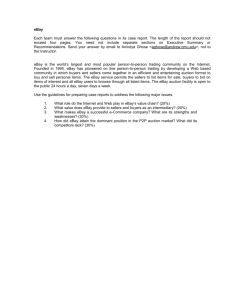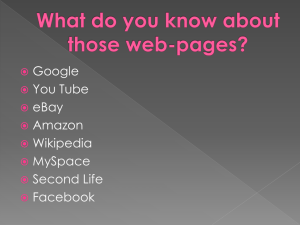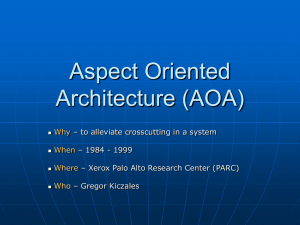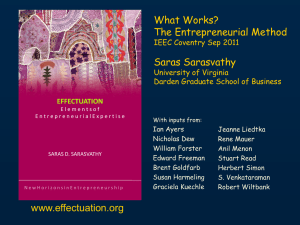ESSAY 1 - Homepages | The University of Aberdeen
advertisement
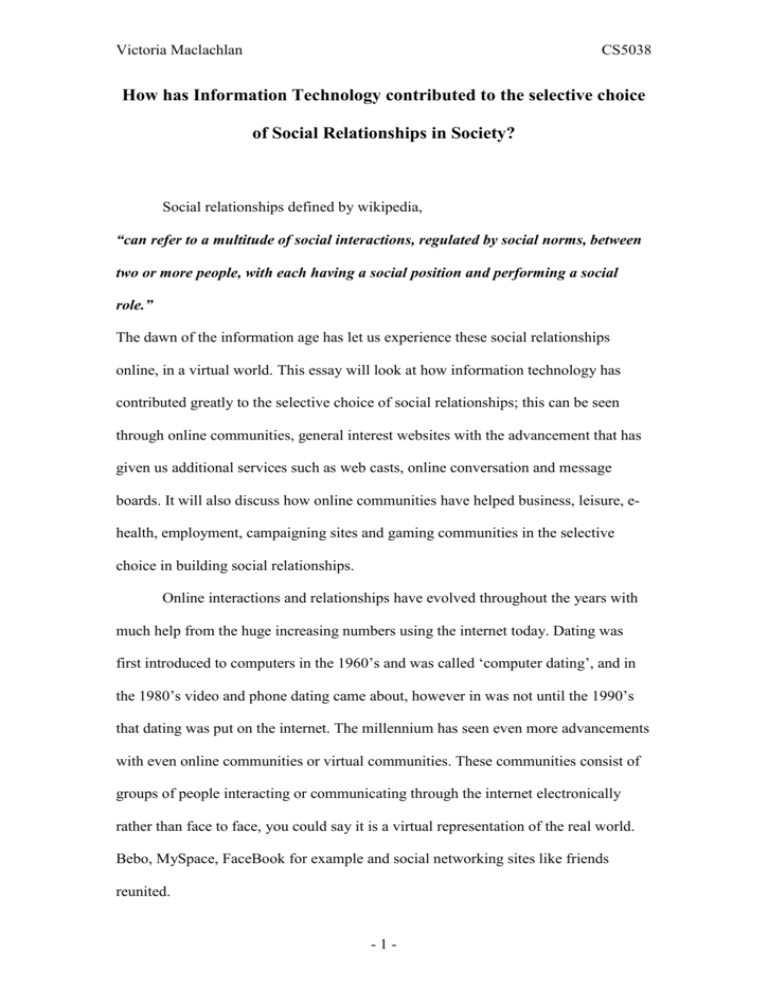
Victoria Maclachlan CS5038 How has Information Technology contributed to the selective choice of Social Relationships in Society? Social relationships defined by wikipedia, “can refer to a multitude of social interactions, regulated by social norms, between two or more people, with each having a social position and performing a social role.” The dawn of the information age has let us experience these social relationships online, in a virtual world. This essay will look at how information technology has contributed greatly to the selective choice of social relationships; this can be seen through online communities, general interest websites with the advancement that has given us additional services such as web casts, online conversation and message boards. It will also discuss how online communities have helped business, leisure, ehealth, employment, campaigning sites and gaming communities in the selective choice in building social relationships. Online interactions and relationships have evolved throughout the years with much help from the huge increasing numbers using the internet today. Dating was first introduced to computers in the 1960’s and was called ‘computer dating’, and in the 1980’s video and phone dating came about, however in was not until the 1990’s that dating was put on the internet. The millennium has seen even more advancements with even online communities or virtual communities. These communities consist of groups of people interacting or communicating through the internet electronically rather than face to face, you could say it is a virtual representation of the real world. Bebo, MySpace, FaceBook for example and social networking sites like friends reunited. -1- Victoria Maclachlan CS5038 The online community sites vary as they have different levels of interaction and participation among their members. This ranges from adding comments or tags to a blog or message board post to competing against other people in online video games such as massive multiplayer online role-playing games1. These MMORPG are games that require you to role play a fictional character in a game in a virtual world, 94% of these games are fantasy genre dominant. Fantasy genre games are games such as World of Warcraft, Lineage, Dungeons and Dragons and Lord of the Rings games. On these sites Voice over Internet Protocol (VOIP) is used to be able to talk to others in the virtual world about there avatars (fictional characters within the virtual world). Being able to do this can allow for help character advancement and for purchasing of virtual resources, like game currency, real estate and magic weapons. The MMORPGs also gives users a competitive advantage by being able to actually buy important features to the game or actual fictional characters online. An island in the game Project Entropia was sold in the United States for $26,500, this illustrating that gaming in online communities has contributed to the selective choice of our social relationships. Although there is the opportunity to buy and sell within these communities, there are crimes associated with it such as duping and that of stealing peoples accounts. One of the largest online communities is that of eBay, the site brings a "community of interest" together with a "community of transaction". EBay illustrates that, "One thing that really is true about eBay is it is a community-commerce model, with users who help one another" (Anders, 1999)2. 1 Wikipedia, Overview of Online/Virtual Communities, In Community We Trust: Online Security Communication at eBay, Section: Community of Commerce, Josh Boyd, Purdue University. 2 -2- Victoria Maclachlan CS5038 Showing us that clearly eBay brings together a community, brought together through transaction, this offers the selection of social relationships through, similar interest on bulletin boards, by buying or selling similar things, sharing knowledge as buyer or sellers and so on. According to the company overview in 2002 ‘The key to eBay’s success is trust’, this has been defined through ‘five basis values’3. The trust is effectively built up through comments and transactions between the buyer and seller. This then gives the buyer or seller either a good or bad reputation online, which will help other members of the public, view that persons page and decide whether they think that person is worthy of buying from or selling to. This process illustrates clearly how information technology has contributed greatly to the selective choice of social relationships. This trust and feeling of community is reflected in the form of rewards and punishments in the form of the feedback profile which gives members a sense of belonging and a sense that others matter individually and within a group, which is exactly what a community is. Illustrating that the commitments and feelings are just as real in the real world as they are in the virtual world, making it just as easy to make a choice of a social relationship on the basis of the togetherness. Rothenbuhler (1991) did a study of geographic community and discovered that for community involvement there were two conditions that of ‘staying informed about what happens in the community and getting together with community members’. The results from these studies are also present in eBay’s virtual community and can be seen through feedback forums, bulletin boards, chat rooms and the obvious buying and selling process. Showing us that by being kept informed by these methods the community is In Community We Trust: Online Security Communication at eBay, Section: eBay’s Solution: Trust in Community, Josh Boyd, Purdue University. 3 -3- Victoria Maclachlan CS5038 growing and so is that of social relationships. Proving that eBay is in fact the world’s leading person to person online trading community4. An article on eBay Wiki and eBay Blogs set to expand the eBay community, tells us how better versions of Wiki and Blogs has been introduced along with Skype, which really is making the social relationships online much better and easier within the virtual community. Social relationships in communities are also seen in E-Health as pointed out in an electronic journal called the Virtual Community. The author Howard Rheingold explains how when he visited the online parenting conference he was met with speed, security and the precise information he needed to know. Rheingold discovered that people are available round the clock to talk to, whether they are other parents, doctors or nurses. Rheingold explains that what attracted him there was ‘the attitudes people exhibit to each other in the tone of what they say in public’ and goes on to explain that people ‘give you emotional support on a deeper level, parent to parent’. There are hundred of topics available to speak about at the parent conference and when needed Rheingold posted information up and helped. The problem he ran into was with his two year old daughter when she got a tick, this led his wife to call the pediatrician, and whilst she did that he got an answer within minutes online. The tick was removed before the pediatricians office even managed to call back. Online community websites connected to health has helped lots of people with problems by just chatting with someone sharing or has been through the same problem. This has brought made social relationships online and in Rheingold’s daughter’s case, he selected the relationship of somebody online over the pediatrician. In an E-Health seminar recently by Dr. Stuart Scott, he explained how in the future electronic booths would be coming into action in remote islands, such as 4 Ibid -4- Victoria Maclachlan CS5038 Orkney or the Shetlands. This would enable patients to see a doctor through video or interact through the internet. This yet again demonstrates that information technology has clearly contributed to our choice of even what doctor we will have a social relationship with. The second part of this essay will cover general interest sites and chat rooms. This is quite clear how I.T. has contributed to the selection of social relationships by making sites more like social groups, clubs or even cliques within the virtual world. General interest sites can be from hobbies like skiing and horse riding, where people interact through chat rooms, message boards, comments through photos being posted or whatever to feminist, gay, movements or even green peace. Feminist.com is a site that offers a search engine to ‘ASK AMY’ a number of topics, and then there is a series of questions and answers that other people have asked as well. Illustrating that by having an almost agony aunt on the site, it offers a social relationship which people may use more on the internet with their identity unseen than in reality. The site also posts up coming events, of awareness like that of Amnesty International, marches or (domestic abuse) conferences. By having events posted on these websites it allows people come together in reality, showing us again that I.T. has contributed greatly to general interest websites which produces social relationships through selection. Green peace is similar to this site, along with many more as well, however green peace offers more has Blogs, discussion forum and even how to volunteer or get involved with projects all round the world. It is not only gaming sites, transactions, E-Health and general interests sites that bring people together as a community, but businesses, leisure and educational sites like that of universities do as well. Information technology has contributed to the selection of social relationships amongst the business world. Business communication is a key factor to the success of -5- Victoria Maclachlan CS5038 a business, as it is any ‘communication used to promote a product, service or organisation’. Having online businesses is a great way of marketing, customer/client and media relations which promotes the company and hence business relationships are born. Social values within businesses are also important, business values are, “an informal term that includes all forms of value that determine the health and well-being of the firm in the long-run”5. By understanding this, integrated platforms and better tools can be provided to meet requirements in a much better way6. Resulting in better functions and more understanding of what is needed; this has helped society’s selective choice on social relationships. Employment on the internet, has also given us the opportunity to make social relationships with businesses through a virtual community, through advice boards and being able to apply for jobs to companies through electronic mail. An article on social relationships in electronic forums looked at work relationships and electronic communication. Many writers and professionals and such like have considered how new technologies are going to effect work life. Sproull and Kieseler (1991), believe many of them think that electronic mail will get rid of organisational hierarchies or at least reduce the barriers to the communication between people at different levels of hierarchy in an organisation7. This illustrates that our selective choice of social relationships can be preferred electronically through the use of information technology over reality. In the same article Heintz (1992) goes on to state that electronic group cohesion “is smaller and more tightly knit”8. 5 http://en.wikipedia.org/wiki/Business_Value DiDuca, D. Success factors of Online Business Communities: The EURESCOM GOLD: Conclusion 7 Kling, R. (1996) Social Relationships in Electronic forums, Section: work Relationships and electronic communication 8 Ibid 6 -6- Victoria Maclachlan CS5038 Aydin and Rice (1992) show us how the selective process in which people choose a social relationship can be greatly helped through information technology. Aydin and Rice look at how different groups of people are brought together through networks. Empirical evidence shows that computer nets help foster a sense of community among geographically or organisationally isolated professionals; this can be seen through special librarians and oceanographers9. Social relationships have benefited from the use of information technology greatly through the business world and will continue to advance. A study by Kiesler et al. (1984) looked at face to face conversation and discussion and compared it with computer based communication. Results were in favour of computer based communication due to the absence of non-verbal cues showing I.T. can also make it easier to work in an electronic world. Social values, cohesion, trust are all important factors in communities and by having them present in virtual communities now, it allows us to communicate easier and more efficiently with others. Society has seen that through online/virtual communities gaming industries, businesses, employment, E-health, general interest and campaigning sites, leisure, education, travel and many more have all contributed to the selective choice of a social relationship. 9 Kling, R. (1996) Social Relationships in Electronic forums, Section: work Relationships and electronic communication -7- Victoria Maclachlan CS5038 Bibliography 1. Anders, G. (1999b, November 22). The auctioneer (interview with eBay CEO Meg Whitman). The Wall Street Journal, p. R68 2. Boyd J. (2002, April 3). In Community We Trust: Online Security Communication at eBay, Purdue University. http://jcmc.indiana.edu/vol7/issue3/boyd.html#Solution 3. DiDuca, D. Success factors of Online Business Communities: The EURESCOM GOLD Study.http://www.eurescom.de/message/messageMar2002/successfac tors.asp 4. Kling, R. (1996) Social Relationships in Electronic forums http://www.december.com/cmc/mag/1996/jul/kling.html 5. Maitland, A. (2006, June 15). eBay launches Wiki and Blogs to expand its online community: eBay Wiki and eBay Blogs set to expand the eBay community, http://www.pocketlint.co.uk/news/news.phtml/3650/4674/ebay-blogs-service-wikibeta.phtml 6. Rheingold, H. (1991)The electronic version of The Virtual Community http://www.rheingold.com/vc/book/ 7. Wikipedia – Business Value http://en.wikipedia.org/wiki/Business_Value 8. Wikipedia – Virtual Communities http://en.wikipedia.org/wiki/Online_communities -8-
